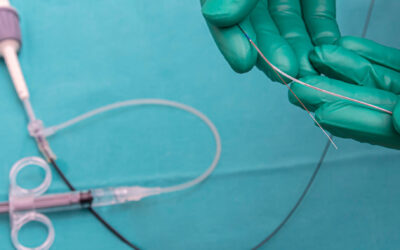TAVR
TAVR, or transcatheter aortic valve replacement, is a form of minimally invasive surgery that repairs the aortic valve in your heart. If the aortic valve is not working properly, it can cause aortic stenosis, which restricts blood flow to the rest of your body. TAVR allows your cardiologist to treat aortic stenosis without using open-heart surgery.
Who Is TAVR For?
TAVR is ideal for patients who need their aortic valve replaced but who cannot have open-heart surgery.
Your provider may suggest TAVR as a treatment option if:
- Tests show that your aortic valve is not working properly.
- Your health would be put at risk if you had open-heart surgery.
How Is TAVR Performed?
Instead of removing the valve entirely through open-heart surgery, your provider puts a replacement valve in its place. The procedure is similar to placing a stent. Your provider will thread a catheter through one of your arteries and into the damaged heart valve. The new valve expands inside the old valve and is able to regulate blood flow properly.
What Are the Benefits of TAVR?
Since the surgery is minimally invasive, there is lower risk of infection, less pain and less blood loss than with open-heart surgery. Your recovery time will also be shorter, and you will be able to perform day-to-day activities, including exercise, soon after your procedure.


Heart Center
Call 541-744-6172
Related Services and Conditions
Cardiothoracic Surgery
Cardiothoracic surgery treats conditions of the heart, lungs and chest. Based on the severity of symptoms, your physician may recommend that you see a cardiothoracic specialist. Adults experiencing cardiovascular disease, heart valve problems or lung cancer may...
Heart, Lung and Vascular Care
Cardiac Care at McKenzie-Willamette Medical Center focuses on the functions and disorders of the heart and its connected circulatory system. According to the American Heart Association, 84 million people in the U.S. suffer from some form of cardiovascular disease,...
Cardiac Catheterization
In a cardiac catheterization procedure, a small, hollow tube is inserted into a blood vessel. Once inserted, a number of procedures can be performed through the catheter, including measuring the pressure within the heart’s chambers, collecting biopsies, angiogram, and...
Electrophysiology Services
If you have an irregular heartbeat, you may need to see an electrophysiologist who can diagnose the source of your condition. The electrophysiologists at McKenzie Heart’s Heart, Lung and Vascular Center perform studies to understand the nature of your arrhythmia and...




